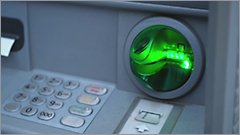EverSafe Scam Watch
Protecting Your Financial Health
Electronic Devices Are Stealing Payment Card Info
…And Low-Income Consumers Face Extra Risk
Law enforcement officials have become increasingly concerned about the spread of devices that capture data from ATMs, gas pumps, and other card-based payment systems. Known as “skimmers,” the devices can be planted by thieves to steal account numbers and, ultimately, people’s money.
 According to USA Today, federal investigators are pursuing skimming frauds in states including California, Florida, Alabama, and Nevada. The number of skimmed debit cards soared 96 percent in 2023, the newspaper reported, citing an FBI estimate that skimming now costs the public more than $1 billion a year.
According to USA Today, federal investigators are pursuing skimming frauds in states including California, Florida, Alabama, and Nevada. The number of skimmed debit cards soared 96 percent in 2023, the newspaper reported, citing an FBI estimate that skimming now costs the public more than $1 billion a year.
While the scam affects all kinds of consumers, it has emerged as a particular risk for low-income people in welfare programs. That is because payment cards provided in antipoverty programs typically come without consumer protections that may safeguard holders of bank debit and credit cards, according to the New York Times. This means that when scammers capture data imbedded in a welfare payment card, the victim can get stuck with the charges. “Electronic benefit transfer” payment cards for food stamps and state welfare programs have emerged as major targets for skimming, the Times reported.
In a recent California case, a Romanian national named Marius Oprea was sentenced to more than six years in federal prison for leading a skimming ring that targeted Bank of America accounts used in a range of antipoverty programs. The bank provides debit cards used by low-income, unemployed, and disabled individuals, according to the U.S. Attorney’s Office for the Central District of California.
The skimming trend has prompted California, Oklahoma, and Maryland to take steps to protect low-income card holders; however these states remain the exception, the New York Times reported.
Summer Weather Brings Driveway-Paving Scams
The scam starts with a flyer left on your doorstep, or a knock on the door. The offer goes something like this: workers are in your neighborhood, and they’re offering you a discount to repave your driveway or fix your broken concrete – if you sign up right away.
Don’t fall for it. These driveway-paving offers often involve unlicensed workers who do shoddy work with no warranty or take a deposit and leave homeowners with a costly, unfinished mess.
 “They knock on people’s doors and defraud them out of money, fail to complete work, perform exceedingly sub-standard work or take their deposits and run,” warns Lee Glass, an investigator with the Montgomery County, Maryland Office of Consumer Protection.
“They knock on people’s doors and defraud them out of money, fail to complete work, perform exceedingly sub-standard work or take their deposits and run,” warns Lee Glass, an investigator with the Montgomery County, Maryland Office of Consumer Protection.
One victim in Gaithersburg, Md., told investigators that she was “lied to about what they were going to be doing, and I have had three other reputable licensed concrete businesses say it was the worst job they have ever seen, and the whole job has to be ripped out.”
The scammers often have out-of-state licenses on their trucks, which typically don’t even have a company name on them. Moreover, the fact that a fake contractor may have done work for your neighbors in the past offers no protection. Similar scams, often targeting elderly homeowners, have been reported in Virginia, Texas, California, and North Carolina.
The Better Business Bureau offers these tips to avoid falling victim to a fraudulent asphalt paver.
- Use caution with unsolicited offers. If you really need home improvement work, get an estimate from a reliable company rather than hiring a contractor who shows up at your door.
- Make sure to do the research on any contractor you hire, including checking with your local consumer office, the BBB, or even searching the company online for negative reviews. Ensure that the person is licensed. You can call your local county, or search the BBB’s website for local paving companies where you live.
- Insist on a written agreement that includes a warranty. Never pay for the project upfront. Legitimate contractors will allow you to pay for the work in segments, as each piece of the project is completed.
- Pay with a credit card instead of cash. If you write a check, make it out to the company name, not to an individual.
Scammers are Targeting Older Adults More Than Ever
While fraud is a threat to people of all ages, “older Americans are under siege from scammers,” according to AARP. The threat that scams pose for retirees has “never been more pervasive,” the nonprofit advocacy organization declared in a recent article
AARP highlighted six increasingly common frauds that older adults should be watching out for:
-
 Check Cooking. In this scam, crooks steal a paper check – typically out of a mailbox – and take a photo of it. They then use software to alter details of the check, print it out, and spend or deposit it, often with the help of a bank app. Check cooking represents a technological advance from the older scam of “check washing” in which thieves used chemicals to alter checks. To thwart such frauds, experts say it’s a good idea to mail checks directly at the Post Office rather than dropping them in a mailbox.
Check Cooking. In this scam, crooks steal a paper check – typically out of a mailbox – and take a photo of it. They then use software to alter details of the check, print it out, and spend or deposit it, often with the help of a bank app. Check cooking represents a technological advance from the older scam of “check washing” in which thieves used chemicals to alter checks. To thwart such frauds, experts say it’s a good idea to mail checks directly at the Post Office rather than dropping them in a mailbox.- Voice Printing. Increasingly, criminals are using technology to copy their target’s voice for use in schemes to defraud. Once they possess a copy of your voice (which may be available in videos and social media), they can call your bank or insurance company in an attempt to gain control of your accounts. The criminal use of fake voices is one more reason to monitor your financial accounts with care.
- Celebrity Impersonation. Scammers have figured out that people like to hear from celebrities. But if someone contacts you on social media and pretends to be famous, don’t believe it. Fake celebrities will try to draw you into a conversation that has one goal – to get you to give them money. And they will come up with a reason, such as the need to pay damages in a lawsuit. It may seem exciting to get a direct message from a “celebrity,” but it’s just a fraud.
- Multistage Grandparent Scams. Scam Watch has previously warned about the infamous “grandparent scam” in which fraudsters call up grandparents and pretend to be grandkids with an urgent need for cash, such as to pay bail. Scammers are now scaling up this strategy with entire “call centers” staffed by young people. When a grandparent ends up on the line, the young staffers are instructed to reference an official “case number.” Experts say this makes the request seem real and increases the likelihood that grandparents will send money for what is really a non-existent arrest. Best defense: If you ever get a call about a family member who needs emergency cash right away, hang up. Make sure to reach the relative directly and confirm the story. If you can’t reach the relative, contact another close family member.
- Delayed-Action Sweepstakes. A scammer contacts you to say you’ve won a vast fortune. But they first want personal information to confirm your identity. If you provide it, you will likely become a victim of identity theft. This fraud is a variation of an older sweepstakes scam in which crooks ask their victims to pay a fee upfront if they wish to collect their prize. Be assured: If someone calls you up unexpectedly and says you have won a ton of money, it’s a scam.
- Paris Olympics Scams. Experts are already warning about scams focused on travelers to the Paris Olympic games, which are scheduled for July. Criminal hackers often take advantage of such attention-grabbing events by sending fake notes or emails to a traveler’s friends, saying they are having a financial crisis in another country. The hacker reaches out to the traveler’s contacts, asking them to send gift cards or transfer money through a mobile app while they are traveling. In this fraud, well-meaning friends who try to help become the real victims. As with other unexpected requests for cash, be sure to confirm the facts before you send money.



